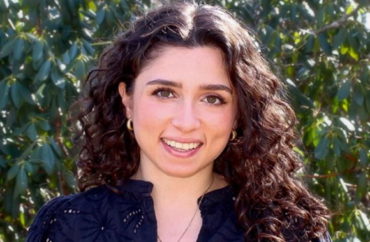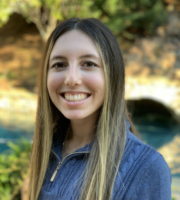
Carine Hajjar said after she respectfully raised her conservative views at the liberal university, most people thanked her for it
Carine Hajjar dealt with ideological homogeneity at Harvard University for three-and-a-half years mostly in silence, but in the spring semester of her senior year, she finally came out as conservative. She said she has no regrets.
“A common stance among Harvard liberals was that conservative viewpoints don’t matter because they’re just wrong,” she said in an interview with The College Fix.
Yet Hajjar said what she experienced after coming out as conservative by becoming a columnist for the Harvard Crimson in her final months as a student at the Ivy League school in the spring of 2021 was camaraderie.
She received a lot of quiet agreement from peers, friends, teaching assistants and professors, including private emails, texts, and even people coming up to her in person expressing their approval and concurrence.
She also said some of her very liberal friends thanked her for writing her column, as they felt like they “couldn’t say anything anymore” due to today’s stigma and intense analysis of everything people say. Others told her to make sure she continued to write it, saying a contrarian point of view was sorely needed.
This shows a lot of people are fed up but are too scared to speak out due to the “progressive orthodoxy that’s a very vocal minority that rules over discourse,” she said.
Hajjar was recently selected as the 2022 recipient of The Fund for American Studies’ Wall Street Journal Editorial Page Joseph Rago Memorial Fellowship for Excellence in Journalism. As a Rago Fellow, Hajjar will work with the Journal’s opinion section through a nine-month internship beginning this fall.
In a telephone interview this month with The College Fix, Hajjar looked back at her experience at Harvard and said she hopes her story might inspire others.
“People are just afraid. It’s not that there are necessarily rules against saying conservative things; there’s just a social structure and an unspoken speech code that makes people really scared to express their views,” she said.
“It goes to show that there is probably a silent majority that is still liberal but thinks that things have gone too far on campus.”
As an undergrad, Hajjar served on the board of the Harvard Crimson’s editorial page and said she grew frustrated with hiding her conservative beliefs to avoid backlash.
“It was really hard to go every single week, multiple times a week, and you’re sitting in these meetings and you know that no matter what you say, any type of moderate or conservative viewpoint is going to be discounted … on an editorial board that’s liberal,” she said.
Being involved in politics and government at Harvard, she found herself often impacted by the school’s liberal, politically charged spaces.
“I was just so frustrated with the fact that if I said anything conservative, I was automatically equated with racism, bigotry … any of the ‘isms’ or ‘ists.’ … I could be talking about something completely different [like] being pro-free market and it would be traced somehow to me being racist,” she said.
She further explained that people want to ask questions about the tough, important issues, whether it be about race or the economy, but they are “so afraid of saying the wrong thing or asking the wrong questions, [students] are not even learning about them because they’re just not asking the question.”
Hajjar also said many students are too scared to argue against loud, progressive voices in their classes due to the fear of being canceled if they said the wrong thing.
“It’s so easy just to take an extremely progressive stance. You know you’re never ever going to get in trouble for it, everyone has to nod along; instead of doing the hard thing and putting yourself out there,” she said.
While she noted that she was never aggressively confronted for her views, she expressed “having to tiptoe around an environment like that led me to want to speak out about it.”
Done with keeping quiet, she decided to write a series of columns for the Crimson under the heading “Always At Odds.” The six columns highlighted her center-right views and promoted freedom and diversity of speech.
Hajjar said she waited to write the series until the final semester of her senior year to avoid suffering long-term consequences of being canceled by her peers.
Her very first column was headlined: “I’m Scared to Write this Column.” Subsequent columns included “Harvard’s Free Speech Fallacy” and “An Argument for Argument: The Price of Conformity.”
While her columns were generally well received, one of them sparked some backlash: “Patriotism is Complicated, Moreso at Harvard.”
“A couple students… equated patriotism and loving… the United States with somehow condoning racism, and I never said anything like that,” Hajjar said.
In addition to writing her column, Hajjar also said there was a lack of conservative representation on campus, prompting her to help co-found the Harvard Institute of Politics’ Conservative Coalition in the spring of 2021.
“If anyone had even a tenuous link to the Trump administration, which was the administration in office, it was really hard to get their voices represented on campus… We all loved the space and respected the people there, but we never heard our own voices, or it was very few and far between,” she said.
To combat this, she said she and her co-founders wrote a letter to the leadership of the Harvard Institute of Politics, asking that they consider fellows who were more traditionally conservative. This resulted in more conservative representation in the institute’s lineup, she said.
When asked about what other conservative students who might be in similar situations of being surrounded by liberalism and self-censoring their views could do, Hajjar said don’t try to “own the libs.”
Instead, “be respectful, measured, and approach these conversations gradually and very respectfully,” being sure not to just shy away from conversation, she said.
She also suggested seeking out those who share similar views. While she mentioned they shouldn’t create an echo chamber, she said it is important to have the ability to participate in open-minded conversations with like-minded people.
“I want to make sure people are aware that there is an unspoken orthodoxy on college campuses, and it’s getting in the way of people’s education,” she said.
“The issue is that the woke stances that are taken on college campuses are held by an ultra minority in our country. When you look at Democrats electorally right now, they’re in hot water because the party decided to trend more and more progressive, and average Americans—even average liberals—don’t hold views that are that radical.”
MORE: ‘It’s hard to be patriotic at Harvard,’ conservative editor at student paper says
IMAGE: TFAS
Like The College Fix on Facebook / Follow us on Twitter






Please join the conversation about our stories on Facebook, Twitter, Instagram, Reddit, MeWe, Rumble, Gab, Minds and Gettr.